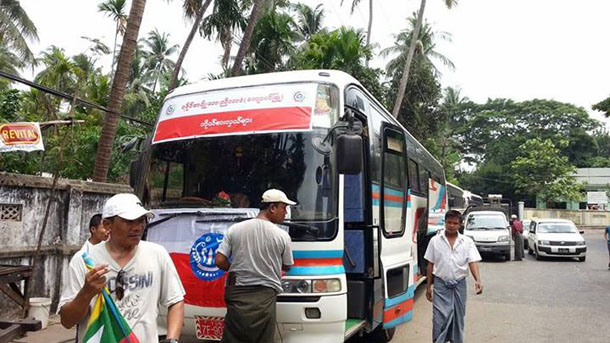RANGOON — Hundreds of representatives of Arakanese Buddhist organizations and political groups will gather for a five-day meeting in Arakan State’s Kyaukphyu Township this weekend to discuss the socioeconomic challenges of their state and the conflict between Arakanese and Rohingya Muslim communities, an organizer of the event said.
Nyi Nyi Maung, secretary of the Working Committee for the Rakhine National Conference, said the first participants would arrive Friday at Kyaukphyu town located on Ramree Island off the Arakanese coast.
“We expect over 1,000 representatives. Representatives from Rangoon are coming by cars today. They may arrive here this evening; representatives also include our Rakhines [Arakanese] who live abroad. We mainly intend to discuss the issue of how to have peace and development in our region,” he told The Irrawaddy.
He said Arakanese community organizations and political parties, such as the Arakan National Party, and Arakan armed rebels groups would attend the event.
Nyi Nyi Maung said some of the discussions will focus on how the Arakanese population can gain greater access to the natural resources of their impoverished state, which has vast offshore oil and gas reserves that are being exported to fund central government coffers.
Since 2012 Arakan State, in particular its northern townships and areas around the state capital Sittwe, has been the site of recurrent outburst of deadly inter-communal violence between Arakanese Buddhists and the approximately one-million strong Rohingya Muslim minority.
Tensions remain high in the region and in recent months Arakanese nationalists have directed their anger at the United Nations and international aid groups supporting some 100,000 people, mostly Rohingyas, displaced by the violence. Last month, riots against the UN and NGOs caused the suspension of aid operations, which have only recently resumed.
Nyi Nyi Maung said the conference would address the ongoing conflict between Arakanese and Rohingya communities, although he would not go into the details of these discussions.
“We only know that we will discuss the issue of the Bengalis, but there are a lot of issues we are going to discuss. This conference is not only focused on the issue of Bengalis,” he said, referring to the Muslim minority as “Bengalis” to suggest that they are illegal immigrants from neighboring Bangladesh.
“We could not skip this issue as this is a current problem in our region,” he said, adding that the Arakanese faced a “geography problem” because their state bordered on Muslim-majority Bangladesh.
“There is a large population on the other side [of the border]. Our region is good for them to do business and so, they come into our region,” he said, repeating an often heard claim by the Arakanese that large numbers of Bangladeshis are entering their region.
Ethnic Arakanese organizations have held a large conference to discuss their people’s interests four times before, Nyi Nyi Maing said, adding that during the last event in Yathedaung Township in 2012 the political climate in Burma was less open and fewer people could join.
This time around, he said, “We could invite many representatives to this conference from different townships and every other representative who stay in other regions.”
According to government data, Arakan State’s population number around 3.3 million people, a third of whom are Muslim.
There are also substantial Arakanese communities in Rangoon, Burma’s largest city and commercial capital.
Arakanese nationalist groups and state authorities have been accused by international human rights groups of carrying out a campaign of organized violence against the Rohingya in order to ethnically cleanse Muslim communities from the state.
The US-based Human Rights Watch noted in a 2013 report that large meetings of Arakanese politicians, nationalist organizations and radical Buddhist monks had often preceded outburst of anti-Muslim violence, as joint statements and pamphlets calling for their removal were spread after the meetings.
A member of the conference organizing committee on Friday said Irrawaddy reporters were not welcome at the event as some Arakanese leaders disapprove its coverage of the inter-communal conflict.
















